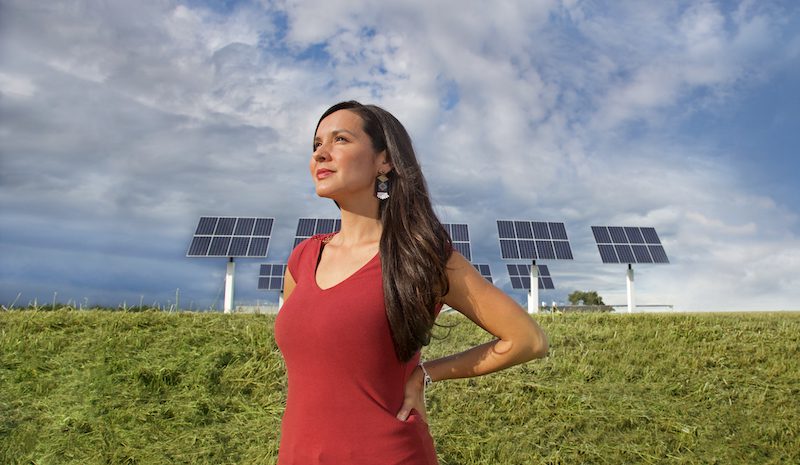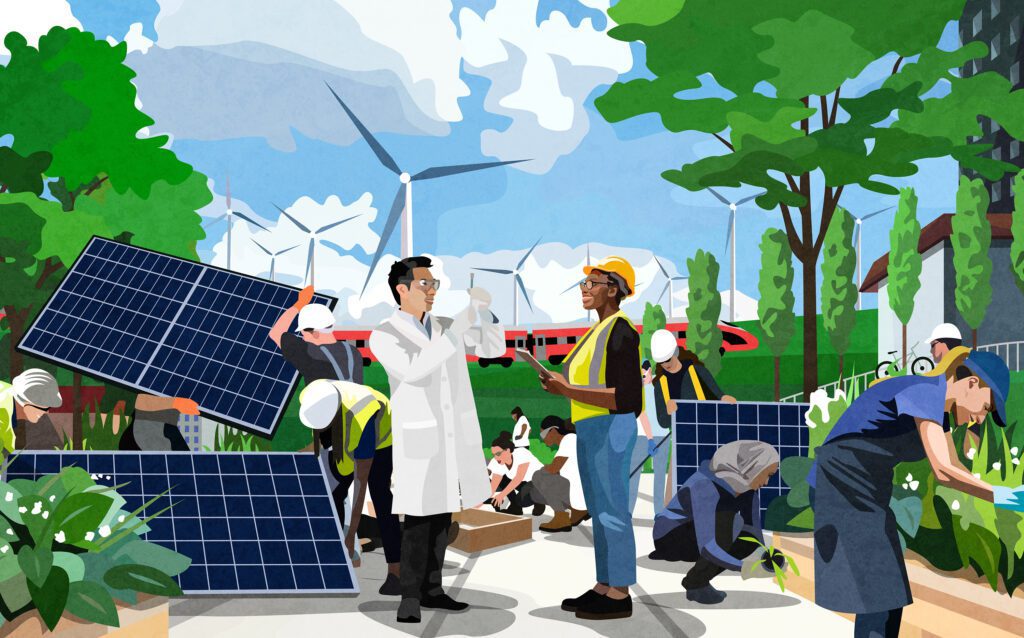Money makes the world go round, and our interest in it is near universal. Whether we have a lot or a little of it, finance is central to our daily lives. And it’s central to solving the climate crisis and the challenges of sustainability. In this blog series, we will delve into the issue of sustainable finance, and the relationship between climate change and finance.
Finance is a term that describes the management, creation and movement of money. It can involve the creation of money through investments, the management and protection of money through insurance, the redistribution of money through tax, the owing of money through debt, and a whole host of other things. Financial institutions such as banks, pension managers, asset managers and insurance companies are the primary players in the finance game. They are governed by rules written by the federal government – and sometimes provincial governments – and these rules are enforced by various governmental bodies and departments, such as the Office of the Superintendent of Financial Institution (OFSI) or the Financial Services Regulatory Authority of Ontario.
There is no universally accepted definition of sustainable finance. When most organizations or governments use the term, they refer to financial activities which take into account the environmental and social impacts of their business practices. The Government of Canada’s definition goes one step further, defining sustainable financial activities as those which “take into account environmental, social and governance factors as a means of promoting sustainable economic growth and the long-term stability of the financial system.”
For the purposes of this blog series, we define sustainable finance as a financial system that does three things:
- Puts the long-term needs of people over the short-term pursuit of profit
- Ensures long-term economic stability
- Funds projects which are consistent with keeping global temperature increase below 1.5 (such as renewable energy)
Sustainable finance is not about making an environmental investment here or there, it’s about creating an entire financial system that helps achieve sustainability goals rather than being at odds with them. This financial system must also consider how profit is made. We all want returns on our investments and pension funds, and profit can also be returned to communities to create new economic opportunities. However, the short-term pursuit of profit should not come at the expense of the long-term good. Profit should not be generated from activities which destroy the environment, rely on unjust labour practices, human rights violations or the erosion of public goods such as healthcare and housing.
Profit need not come at the expense of public good.
Who is funding climate change?
Climate change is driven by the release of greenhouse gas emissions from the burning of fossil fuels. With 10 per cent of all of the world’s known oil reserves found in Canada, the country has become a hub for the funding and production of fossil fuels. Without financial backing the fossil fuel sector is unable to continue its polluting activities. Despite pledges to green their practices Canadian banks, pension funds, and insurers are amongst the world’s top funders of fossil fuels.
In 2022 alone, Canada’s five biggest banks provided over $130 billion to fossil fuel companies and projects, amounting to an astonishing $356 million per day. Despite accounting for just 0.5 per cent of the world’s population, Canadian banks provided around 20 per cent of the $669 billion in fossil financing from banks in 2022.
Banks are not the only culprits funding the fossil fuel industry. Canada’s top ten pension funds have over $115 billion invested in fossil fuel assets, as of 2022. Pension fund fossil fuel assets can be found everywhere. For example, Alberta-based fossil gas and pipeline company Wolf Midstream are entirely funded by the Canada Pension Plan.
Why are financial institutions funding climate change?
The short answer is, because it’s profitable and there is nothing preventing them from doing so.
Historically, Canada’s financial sector has a reputation for being well regulated. Although the 2007-8 financial crash caused a global recession, Canada was far less impacted than the United States because the Canadian government had strong financial sector regulations that prevented financial collapse.
Financial institutions generally follow the rules, but they are driven by profit. It’s important for all of us that these institutions can generate returns on our pensions, bank balances and investments. However, there are currently no rules preventing these companies from generating profit at the expense of the climate.
Financial executives particularly benefit from this lack of rules. The CEOs of all of Canada’s big five banks each earned over $10 million in 2022. RBC CEO David McKay, earned $15.3 million in 2022! That is approximately 235 times more than the average Canadian. These huge paychecks are built partly from the pursuit of short-term profit over the long-term stability of our climate.
What do the financial institutions say they are doing about this?
Many of Canada’s financial institutions have made voluntary commitments to reduce their funding of fossil fuels and/or reach net-zero. Eight banks in Canada are members of the Net-Zero Banking Alliance, and several Canadian asset managers have joined the Net-Zero Asset Managers initiative. However, finance companies rarely back these voluntary pledges with clear plans to meet emissions reduction targets. Additionally, while many financial institutions make ambitious pledges to reach net-zero emissions in their operations, very few are willing to ensure their investments are net-zero.
In 2010, Toronto-Dominion Bank (TD) announced that its “global business operations are now carbon neutral.” Upon closer inspection, this claim only refers to its operations and does not count things like loans and TD only reaches net-zero by purchasing carbon credits rather than actually reducing its emissions.
Additionally, financial institutions know that their customers (you!) are increasingly looking for ways to reduce their environmental impact. Financial institutions offer ‘sustainable’ financial products, like green bonds and sustainable mutual funds, that consumers and investors can buy into, with the hope that their money can grow while supporting climate solutions.. There are no rules controlling these sustainability claims, so financial institutions can make misleading greenwashing statements about the environmental impact of their products.
A number of “sustainable” financial products in Canada have misleading names. The “BMO ESG Corporate Bond Fund” gets its name thanks to an apparent respect of environmental, social and governance factors but, 16.5 per cent or over $9 million of this fund invests directly in oil and gas companies. Many of these financial products quickly lose their environmental credentability once you take a closer look.
How does this relate to human and Indigenous Rights?
The Wet’suwet’en are a First Nation whose territory lies in British Columbia. They have been in headlines over recent years due to the construction of the 670km Coastal Gaslink Pipeline through their unceded territory, without consent. Coastal Gaslink is a TC Energy natural gas pipeline which would transport fracked gas from Dawson Creek to Kitimat. Indigenous Land Defenders are working hard to protect Wet’suwet’en territory.
RBC, TD Bank, Scotiabank, CIBC, BMO and National Bank were involved in providing $10 billion funding to the Trans Mountain pipeline. Canadian financial institutions are funding and insuring infrastructure projects which violate Indigenous rights across Canada.
The financial sector plays a substantial role in the climate crisis. Addressing finance is the missing piece of Canada’s climate plans. Understanding where money goes and its impact is vital in achieving a sustainable future. In the next blog post, we will discuss what climate change could do to your money.
Stay tuned for Part Two and Three coming soon!







